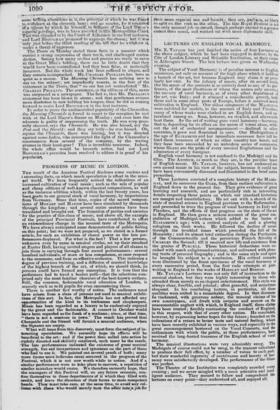LECTURES ON ENGLISH VOCAL HARMONY.
MR. E. TAYLOR has just finished the series of four Lectures on the above subject, which lie had been engaged to deliver, by the City of London Literary and Scientific Institution, at their rooms in Aldersgate Street. The last lecture was given on Wednesday evening.
The subject of Vocal Harmony is of peculiar interest to English musicians, not only on account of the high place which it holds as a branch of the art, but because England may claim it as pecu- liarly her own. In the infancy of music, after its second birth, (for the music of the ancients is as entirely dead as any of its pro- fessors, of the most illustrious of whom the names only survive) the nursery of vocal harmony, as of every other department of the art, was Italy; and it attained a considerable growth, both there and in some other parts of Europe, before it received much cultivation in England. Our oldest composers of the MADRIGAL were indebted for models, to the masters of Italy and Flanders, many of whose works were clothed in an English dress, and na- turalized among us. Soon, however, we rivalled, and afterwards beat them. As the art of writing pure vocal harmony—harmony, that is, depending for its effect on the union of voices alone, with- out the aid of orchestral accompaniment — declined in other countries, it grew and flourished in ours. Our 1Vfatirigalians of the age of ELIZABETH and her immediate successor have left be- hind them treasures of which no other country tan boast; and they haue been succeeded by an unbroken series of composers, whose GLEES are the pride of every musical Englishman and the admiration of every foreigner. English vocal harmony is not confined to the Madrigal and the Glee. The ANTHEM, as much as they are, is the peculiar boast of English music. Mr. TAYLOR, however, has not embraced our own sacred music in his view of the subject, because it could not have been conveniently discussed and illustrated in the brief series prescribed.
These Lectures consisted of a complete history of the MADRI- GAL, and its successor the GLEE, from their earliest cultivation in England down to the present day. They give evidence of great learning and research, and are particularly rich in interesting details respecting those points on which our standard historians are meagre and unsatisfactory. He set out with a sketch of the state of musical science in England previous to the Reformation; and proceeded to trace the progress of vocal harmony in Italy and Flanders, and the effects of that progress on the state of the ad in England. He then gave a minute account of the great con- stellation of Madrigal-writers which added to the lustre of Eetzamern's a,ge ; with a critical analysis of, and a glowing eulogiam on, their works. He followed the decline of music through the troubled times which preceded the fall of the Monarchy ; and its almost total extinction during the Puritanism of the Commonwealth and the pernicious French frivolity of CHARLES the Second; till it received new life and existence from the genius of PURCELL. These historical deductions were en- riched with much enlightened criticism, and enlivened with pleas- ing traits of personal biography ; and in the same style and spirit he brought his subject to a conclusion. His critical remarks were illustrated by the finest specimens of the vocal harmony of every successive period, from the first rude attempts at part- writing in England to the works of HORSLEY and BISHOP: Mr. TAYLOR'S Lectures were not only full of instruction to the musical student, but they were highly interesting to those who attended them merely as an elegant entertainment. His style was always clear, forcible, and pointed; often graceful, and sometimes eloquent. In his concluding lecture, in particular, all these qualities were united in a remarkable degree. In that discourse he vindicated, with generous ardour, the musical claims of his own countrymen, and dwelt with surprise and sorrow on the unaccountable neglect with which, in England itself, these clahas have been treated; forcibly contrasting the conduct of England, in this respect, with that of every other nation. He concluded, however, by expressing better hopes for the future; founded on the indications of a return to better taste and natural feeling, which have been recently exhibited in various ways, and especially in the great encouragement bestowed on the Vocal Concerts, and the enthusiasm with which the public, at those performances, have received the long-buried treasures of the English school of vocal harmony. The musical illustrations were very admirably sung. The Madrigals of course could not be sung, in the manner calculated to produce their full effect, by a number of voices to each part; but their wonderful ingenuity of contrivance and beauty of har- mony were satisfactorily developed. The performance of the Glees was perfect.
The Theatre of the Institution was completely crowded every evening ; and we never mingled with a more attentive and intel- ligent audience. They seemed to follow and comprehend the lecturer on every point—they understood all, and enjoyed all.




















 Previous page
Previous page